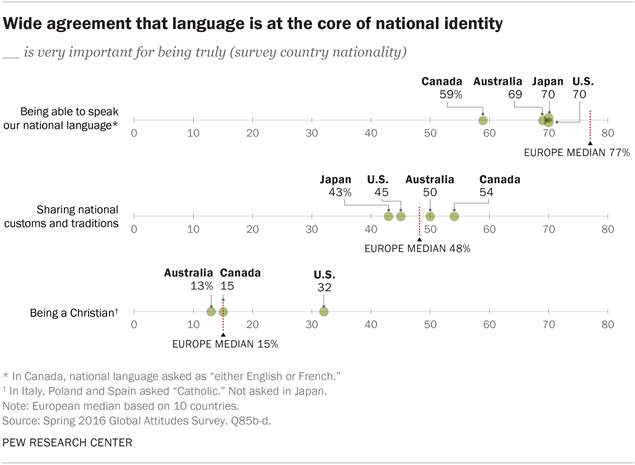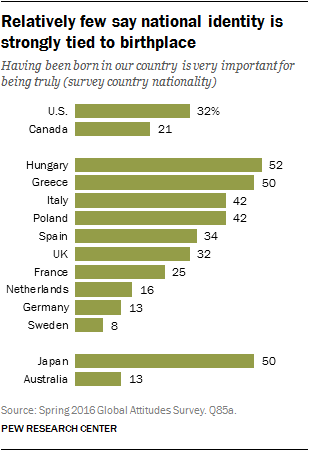 The tide of people move around the worldwhether immigrants or refugees, has raised concerns Australia, Europe and the UNITED STATES. In particular, the ethnic, linguistic and cultural background of migrants has triggered intense debates about the benefits and costs of growth. diversity and the risk of opening borders to national identity. Unease over the cultural, economic and security ramifications of immigration helped fuel the Brexit vote in the UK, encourage the idea of a wall along the US-Mexico border and expand the support for right-wing populist parties in France, Germany and the Netherlands. .
The tide of people move around the worldwhether immigrants or refugees, has raised concerns Australia, Europe and the UNITED STATES. In particular, the ethnic, linguistic and cultural background of migrants has triggered intense debates about the benefits and costs of growth. diversity and the risk of opening borders to national identity. Unease over the cultural, economic and security ramifications of immigration helped fuel the Brexit vote in the UK, encourage the idea of a wall along the US-Mexico border and expand the support for right-wing populist parties in France, Germany and the Netherlands. .
Debates over what it means to be a “real” American, Australian, German, or other nationality have often emphasized the importance of a person being born in a particular country. But contrary to this rhetoric, a Pew Research Center survey finds that people generally place relatively little importance on a person’s birthplace. Only 13% of Australians, 21% of Canadians, 32% of Americans and a median of 33% of Europeans think this is the case. very It is important that a person was born in their country to be considered a true national.
There are a few exceptions – in Hungary (52%), Greece (50%) and Japan (50%) – where around half of the population considers place of birth to be very important. But in other countries – Germany (13%), Australia (13%) and Sweden (8%) – very few people make a strong connection between place of birth and national identity.
These are the results of a cross-national survey by the Pew Research Center, conducted in 14 countries with 14,514 respondents from April 4 to May 29, 2016.
While many countries studied are open to people born elsewhere becoming part of the “nation,” acceptance comes with certain conditions. The majority of countries surveyed believe that it is very important to speak the dominant language to truly be considered a national of that country. This includes a median of 77% in Europe and majorities in Japan (70%), the United States (70%), Australia (69%) and Canada (59%).
Furthermore, the sharing of national customs and traditions is very important for many people’s perception of “who we are”. Just over half of the public in Canada (54%) and about half of the public in Australia (50%) and Europe (a median of 48%) associate the adoption of local culture with national identity. Just under half of Americans (45%) and Japanese (43%) make this connection.
The survey also questioned the link between religious affiliation and national identity. About a third (32%) of Americans think it is very important to be Christian to be considered truly American. This contrasts with 54% of Greeks who say this, but only 7% of Swedes.
Young and old see national identity differently
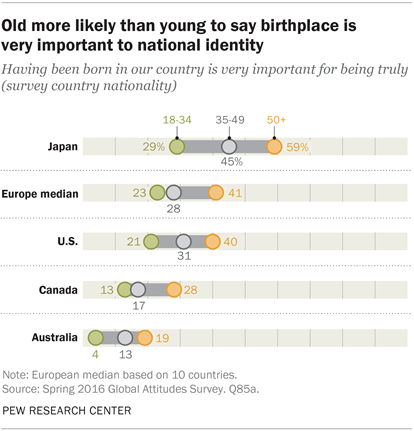 Between the countries studied, there are significant differences in how younger and older generations perceive national identity. In the United States, people aged 50 and over (40%) are more likely than those aged 18 to 34 (21%) to say that it is very important that a person be born in the country to be considered truly American. In Japan, the generational divide is even more pronounced: older Japanese are 59 to 29 percent more likely than their younger counterparts to link national identity to place of birth. Generational differences, although generally more modest, are also evident in Australia and Canada (15 percentage points each), as well as in most European countries studied.
Between the countries studied, there are significant differences in how younger and older generations perceive national identity. In the United States, people aged 50 and over (40%) are more likely than those aged 18 to 34 (21%) to say that it is very important that a person be born in the country to be considered truly American. In Japan, the generational divide is even more pronounced: older Japanese are 59 to 29 percent more likely than their younger counterparts to link national identity to place of birth. Generational differences, although generally more modest, are also evident in Australia and Canada (15 percentage points each), as well as in most European countries studied.
Generations differ even more markedly in the importance of national customs and traditions. In the United States, people aged 50 and over (55%) are much more likely than those aged 18 to 34 (28%) to say that sharing such cultural elements is very important to being truly American. There is a similar generation gap of 20 percentage points in Canada, Australia and Japan. In Europe, a median of 37% of those aged 18 to 34 believe that this aspect of national identity is very important, compared to 56% of those aged 50 and over.
Partisan views on national identity in the United States, Australia, Canada, and Europe
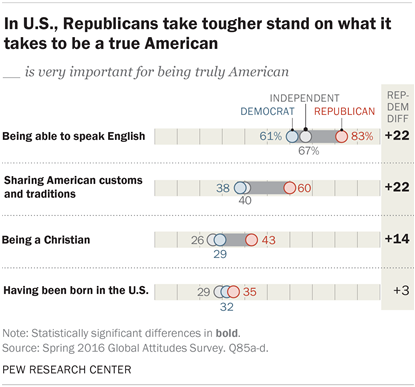 In many countries, the debate over national identity is partisan.
In many countries, the debate over national identity is partisan.
In the United States, more than eight in ten Republicans (83%) say that language proficiency is a very important condition for being truly American. Fewer independents (67%) share this strong belief and even fewer Democrats (61%) agree. Among Republicans, 60% say that for someone to be considered a true American, it is very important that they share American culture. Only 40% of independents and 38% of Democrats agree that this is very important to being truly American.
There is also a clear partisan divide in the United States over the importance of being a Christian. More than four in ten Republicans (43%) say it is a very important part of being an American. Fewer Democrats (29%) and independents (26%) share this view.
Notably, there is not much partisan difference in the connection between country of birth and American national identity. About a third of Republicans (35%) and Democrats (32%) say it is very important to be born in the United States. Slightly fewer independents (29%) share this point of view.
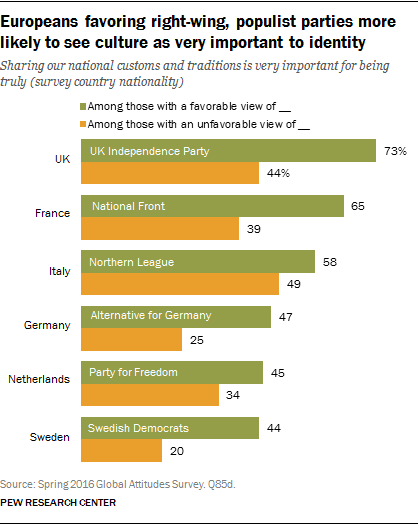 Conceptions of what constitutes national identity also divide public opinion along party lines in some European countries. In the United Kingdom, 73% of those who have a favorable opinion of the right-wing UK Independence Party (UKIP) say it is very important to embrace British culture to be British. Only 44% of those with an unfavorable view of UKIP agree. In France, sharing French customs and traditions is linked to national identity for those who have a favorable view of the right-wing populist National Front (FN) (65% believe this is very important). Only 39% of those who have an unfavorable opinion of the FN strongly associate the culture with being truly French.
Conceptions of what constitutes national identity also divide public opinion along party lines in some European countries. In the United Kingdom, 73% of those who have a favorable opinion of the right-wing UK Independence Party (UKIP) say it is very important to embrace British culture to be British. Only 44% of those with an unfavorable view of UKIP agree. In France, sharing French customs and traditions is linked to national identity for those who have a favorable view of the right-wing populist National Front (FN) (65% believe this is very important). Only 39% of those who have an unfavorable opinion of the FN strongly associate the culture with being truly French.
There is a similar 24 percentage point difference on the importance of Swedish customs and traditions between those who sympathize with the right-wing populist Sweden Democrats and those who view them unfavorably. And in Germany, there is a 22-point gap in the importance of culture between those who favor the Alternative for Germany party and those who do not.
In Australia, around eight in ten (79%) supporters of the center-right Liberal Party and around seven in ten (68%) supporters of the center-left Labor Party say it is very important to speak English to be considered Australian. Only a third of left-wing and pro-environment Greens agree. There is an even greater partisan disparity regarding the importance of customs and traditions. More than six in ten Liberal Party supporters (63%) believe that adherence to Australian customs and traditions is very important to national identity. Just over four in ten Labor supporters agree (44%). And even fewer Greens agree (15%). Percentage point difference on the importance of Swedish customs and traditions between supporters of the right-wing populist Sweden Democrats and those who view them negatively. And in Germany, there is a 22-point gap in the importance of culture between those who favor the Alternative for Germany party and those who do not.
In Canada, although majorities of all major parties say it is very important to speak French or English, this sentiment is most strongly shared by those who support the center-right Conservative Party of Canada (68%), followed by by those who support the center-right party. Left-wing Liberal Party (59%) and those who support the social-democratic New Democratic Party (53%). More than six in ten conservatives (63%) believe that a person must share Canadian customs and traditions to be truly Canadian. 57% of Liberals agree, but only 46% of New Democrats share this view. Relatively few Canadians aligned with one of these major parties think it is very important to national identity to be Christian or to have been born in Canada.
CORRECTION (April 2017): The top line accompanying this report has been updated to reflect a revised weighting for the Netherlands data, which corrects the percentages for two regions. The changes due to this adjustment are very minor and do not materially alter the report’s analysis. For a summary of the changes, see here. For up-to-date population figures for the Netherlands, please contact info@pewresearch.org.



